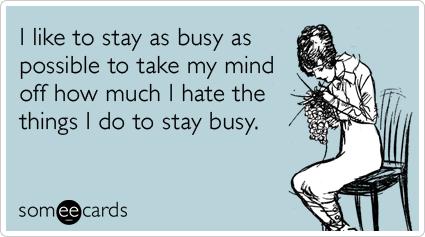Whenever I realize I’ve been running ragged, I know I’ve fallen into a rut of reactive rather than proactive work. Instead of going about my day steered by plans and intentions, the unstable “whatever comes up” gets to dictate my day.
This schedule of working deadline to deadline, fighting fires and flying by the seat of your pants racks up time debt. You’re borrowing from other areas of your life like spending time with your family or on your wellbeing.
Humans tend to be bad at understanding how we’ll feel in the future. In our mind’s Pollyannaish eye, the future is a world of order and excellence in which you exercise everyday, you don’t bring work home with you, you finally learn Spanish, you catch up with that friend you haven’t spoken to in forever. In reality, something always comes up, there is always something to do.





